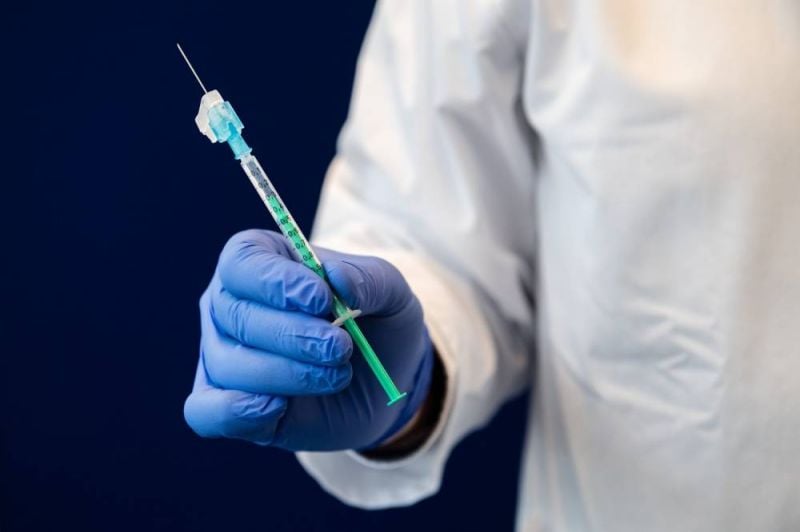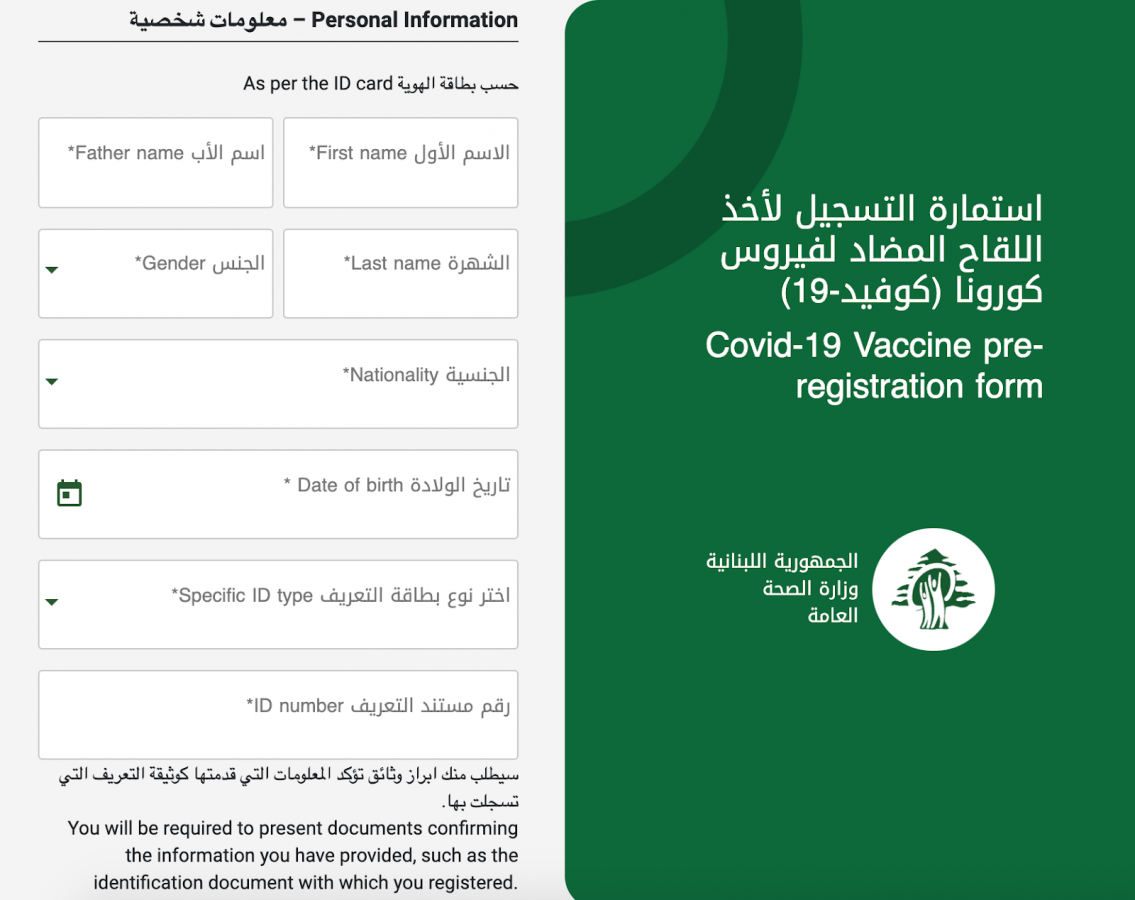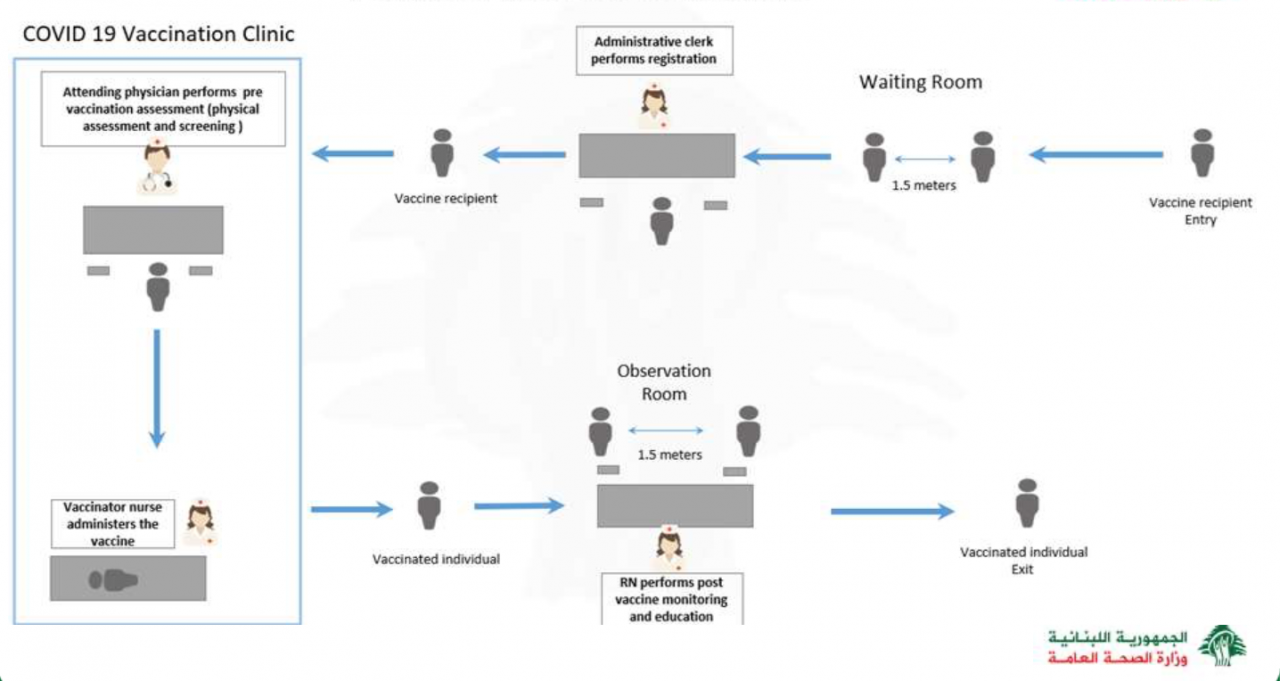
Lebanon is in the final stages of negotiations on a deal to receive 1.5 million doses of the AstraZeneca vaccine. (Credit: Jens Schlueter/AFP)
BEIRUT — The first batch of COVID-19 vaccines is set to arrive in Lebanon Saturday, ahead of the official launch of the national vaccination campaign from the Grand Serail on Sunday.
Vaccinations will begin in earnest on Monday, with the first doses going to front-line health care workers across the country.
Here’s everything you need to know about the campaign, booking an appointment and the vaccines themselves.
Which vaccines does Lebanon have?
Lebanon has so far ordered 6.3 million doses of COVID-19 vaccines — enough to cover around 50 percent of the population, as each vaccine requires two doses. The doses are divided as follows:
• 2.1 million doses of the Pfizer-BioNTech vaccine that will begin arriving on Saturday in a batch of 28,080 doses. After that, additional batches will arrive on a weekly basis and the total order will be split up into 249,000 doses in the first quarter of 2021, 350,000 in the second, 800,175 in the third, and 699,750 in the fourth and final quarter.
• 2.7 million doses via the COVAX facility, a global initiative set up by the World Health Organization and GAVI, which has so far made orders of the Pfizer-BioNTech, Novavax and AstraZeneca vaccines. Lebanon is expected to receive 340,800 doses of the AstraZeneca vaccine in the first half of 2021, beginning at the end of February.
• 1.5 million doses of the AstraZeneca vaccine via a deal that is in the final stages of negotiations.
The national committee on COVID-19 vaccines last week approved the emergency use of the Russian Sputnik V vaccine and is currently reviewing the Chinese Sinopharm vaccine. Several private sector actors, such as universities, banks and NGOs, are working on deals to secure vaccines for their employees or communities.
You will not be able to choose the type of vaccine you receive, as you will be offered whichever vaccine is available at your nearest vaccination center, Mohammad Haidar, a medical advisor to the caretaker health minister, tells L’Orient Today.
Who will get vaccinated first?
The Health Ministry has drawn up a list of priorities for who receives the vaccine based on the main criteria of likelihood of exposure to COVID-19, risk of serious illness or death from the virus, and importance in fighting the pandemic and keeping society running. Vaccines are non-compulsory.
The first batch of 28,080 doses will be administered to front-line health care workers, according to Abdul Rahman Bizri, the head of the national committee on COVID-19 vaccines.
After that, vaccinations will be distributed in the following order:
1. High-risk health care workers and those over 75 years old
2. 65- to 74-year-olds, 55- to 64-year-olds with pre-existing health conditions, and Health Ministry epidemiological teams
3. All 55- to 64-year-olds, 16- to 54-year-olds with pre-existing health conditions, and remaining health care workers
4. Prison staff, elderly home staff, carers of those with special needs, and others “essential to the functioning of society”
5. Other vulnerable populations, such as school teachers, child care workers, and family caregivers for the elderly
6. All others wishing to receive the vaccine
How do you register to receive the vaccine?
Anyone wishing to receive the vaccine must register their details on the Impact platform, either on the website http://covax.moph.gov.lb/ or by calling the hotline at 1214.
You will be asked to provide details including your personal identification information, your address, your occupation and any medical conditions.
If you need to amend any personal details, you can do so by returning to the link and entering the phone number you registered with.
 Screenshot of the Impact registration form.
Screenshot of the Impact registration form.
When your time to get vaccinated comes around, you will be invited to book an appointment at a vaccination center near you.
Both the Pfizer-BioNTech and AstraZeneca vaccines require two doses, spaced 21 days apart. The Impact platform will automatically send you a notification inviting you to your second appointment.
What to expect when you go to your appointment
The national vaccination plan lists 49 private and public hospitals that will eventually function as vaccination centers. These centers will open progressively as the number of doses available increases.
Once in full swing, centers should vaccinate an average of 400 people per day during 8-10 working hours.
According to the plan, the entire vaccination process should take around 35 minutes per person: 5 minutes at registration; 5 minutes in the waiting area; 5 minutes receiving the vaccination; 15 minutes of observation by medical staff in case of side effects; and 5 minutes receiving additional information on the vaccine.
“We are trying to create as welcoming an environment as possible,” says Georges Ghanem, the medical director of the Lebanese American University Medical Center-Rizk Hospital. “We’re calling it our vaccination village to make it friendly and remind people that vaccination is not a hospital or patient problem.”
 Patient flow at COVID-19 vaccination sites as diagrammed in the vaccination plan.
Patient flow at COVID-19 vaccination sites as diagrammed in the vaccination plan.
One of the biggest vaccination centers will be Rafik Hariri University Hospital, which has been the lead hospital for treating COVID-19 patients since the virus was first detected in Lebanon nearly a year ago. One of the hospital’s buildings has been set aside with its own dedicated parking lot to welcome those coming for their vaccine.
“We are almost ready to go; we’re just putting on the final touches,” says Oussaima Dbouni, an infectious disease specialist and the director of the vaccination center at RHUH.
Health care workers at RHUH are aiming to administer 500 doses every day to begin with, ramping up vaccinations once more doses of the vaccine arrive and any teething problems are ironed out, Dbouni added.
How do the vaccines work?
The Pfizer-BioNTech vaccine is an mRNA vaccine, meaning it uses a genetic material called messenger RNA to provide the body with genetic instructions on how to create the spike protein found on the SARS-CoV-2 virus (the scientific name of this coronavirus). This allows the body to identify the virus and produce an immune response to fight it.
Similarly, the AstraZeneca vaccine prompts the body to produce the COVID-19 spike protein and prepare for an immune response. However, instead of mRNA, it uses “double-stranded DNA” — genes from the coronavirus spike protein and from another virus called an adenovirus.
Neither vaccine has the ability to change the recipient’s DNA in any way.
Are the vaccines safe?
Both vaccines have passed through all three phases of testing and have been approved by the World Health Organization and several other medical bodies worldwide.
Pfizer-BioNTech has a reported efficacy in preventing COVID-19 of 95 percent, while AstraZeneca has a 70.4 percent efficacy.
On the whole, both vaccines have only resulted in minor side effects, such as a slight temperature, fatigue, headaches and muscle pain. Only in very rare cases have people experienced allergic reactions to the vaccine.
However, with rapid medical attention, these reactions can be effectively treated. It is for this reason that vaccines are being administered in hospitals, Dbouni says, so that anyone experiencing a reaction can be treated immediately.
“There are now millions around the world who have taken the vaccine, and it has been shown to be extremely safe,” Dbouni says, calling on as many people as possible to register for their vaccination.
“The vaccine is the only hope to cut the vicious cycle of the pandemic.”
For more information, refer to the Health Ministry’s FAQs in English and Arabic, this report from the American University of Beirut’s Knowledge to Policy Center, or contact the Health Ministry’s new COVID-19 vaccine hotline at 1214.
Correction: An earlier version of this article erroneously stated that AstraZeneca’s vaccine had been approved by the US Food and Drug Administration. It is not yet FDA approved. Apologies.